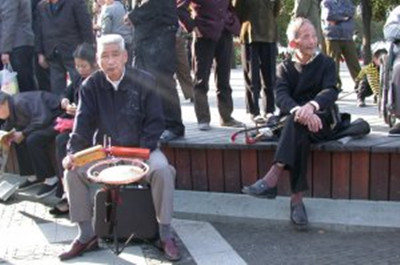(单词翻译:单击)
So here is a question for our listeners:
那么,我想问问我们的听众:
If there were apotion that would allow you to stay young forever, would youtake it?
如果有长生不老药,有人愿意吃吗?
That's obvious, Yael?
这个问题显而易见,
Who wouldn't want to recapture their youth?
有谁不愿返老孩童?
I'm not so sure the answer is obvious.
我倒不这么认为。

Because the researcher has shown that the olderyou get, the calmer and happier you tend to be.
研究人员已经发现人越老越平静、快乐。
Wait a second, old age is hard.
等等,人老了可不轻松,
There is disease, loneliness, and depression.
比如:疾病、孤独、抑郁。
True, I'm not saying that being old age is easy, but social scientists at the University of Texashave found that overall,
你说得对,我并不是说人老了轻松,但是德克萨斯州大学的社会科学家发现:
aging is associated more with positive, passive emotions instead ofnegative, active emotions.
大体而言,老年人情绪更加乐观而被动,并非消极而主动。
Passive emotions?
被动情绪?
Yes, emotions can be passive and active as well as positive and negative.
没错,情绪可分为主动和被动;乐观和消极。
So, for example,feeling calm is a passive emotion.
比如,淡定就是被动情绪,
And it's also usually seen as positive.
也被看作是乐观情绪。
Anxiety and anger, on theother hand, are clearly negative emotions.
反之,焦虑和生气很显然是消极情绪。
And at least in many cases they're also active.
很多时候,还是主动情绪。
Can anger be passive when someone is passive aggressive?
因为他人而好斗时,生气就是被动情绪吗?
Sure, but the point is that in general, aging seems to make us more emotionally passive.
没错,关键是随着人变老普遍的情绪会被动。
And being passive seems to correlate more with positive emotions like calm and contentment.
而被动情绪和很多乐观情绪相关。
It's not clear why aging has this effect, but maybe it's because when you're older you're no longer trying to prove yourself, no longer as anxious about getting ahead.
比如平静或知足。原因不详,但可能是因为人老了,再也不会试着表现自我,也不会争先恐后。
Although, to be fair, the researchers found that the richer and more educated you are, the more you experience positive emotions.
公正地说,研究人员还发现越富裕和有文化的人,乐观情绪会更多。


